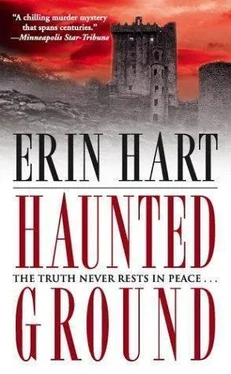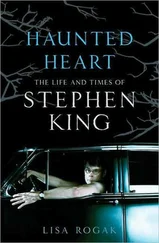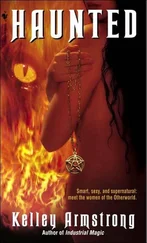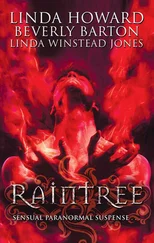“So you’re looking for the record of a trial, or an execution, or perhaps a marriage record of some kind,” Raftery said. He considered for a moment. “You realize that 1652 was smack in the center of the Cromwellian resettlement. There was pretty significant upheaval all over Ireland. Catholic Church records from that time are sketchy. Civil records, especially something as serious as an execution, might be another matter, it’s hard to know. Have you checked the National Library or the Archives?”
“We have a friend in Dublin who’s working on that now,” Cormac said. “You were recommended as a person who might be able to tell us about the local history.”
“As I used to tell my students, there is no history but local history. And some of that is written down, and some of it lost, and a good bit of it is carried in what you might call the collective memory of ordinary people, whether they realize it or not.”
“What was happening here in 1652?” Nora asked. “I only have the most general knowledge of the transplantation. What was that time like for the people living here?”
“You’ve heard the expression ‘to Hell or to Connacht’?” Raftery asked. The kettle began to boil, so he rose and moved slowly to the stove, poured the steaming water into a battered tin teapot, and returned with it to the table to let the tea steep as he continued. “That was the choice many people were given, so they were on the move. For modern comparisons, think of the ethnic cleansing of Bosnia in the early 1990s, the ‘reeducation’ camps of Southeast Asia. Catholic landowners were being uprooted and shifted west, and when they proved understandably slow about going, Cromwell gave them a deadline. They had until the first of May in 1654 to relocate to whatever lands they’d been granted in Connacht. And the English were building garrisons and fortifications along the Shannon to keep them there.” Raftery’s voice was relaxed, but he was completely engaged with his subject. “There was terrible starvation where the English troops went about burning and cutting down the corn, and most ordinary people had to subsist on potatoes. Bands of refugees—entire extended families—were wandering the roads, so an order came down to transport the children who had lost their families, and the women who could work, to the colonies in America. Between the fighting, famine, transportation, and the plague, Ireland lost more than half a million people in the space of about two years. Wolves became so plentiful that the government issued an official order in 1652 prohibiting the export of wolfhounds, and they paid a generous bounty—five pounds for the head of a he-wolf, ten for a bitch. Heads of priests and Tories—the Irish word for outlaws—usually brought a good price as well. This part of Galway was considered a border area, so despite the fact that Connacht had officially been reserved for the Irish, the landowners in what the English called ‘riparian’ areas—along the coasts and navigable rivers—were displaced for security reasons.”
“Including the O’Flahertys?” Nora asked, with a sideways look at Cormac.
Raftery considered. “Yes, including them. Most of the lands around here belonged to various branches of the Clanricardes, the Norman family also known as the de Burgos, or the Burkes. They managed to hang on, despite the fact that they were Catholics. But there were a few smaller landowners as well; the O’Flahertys of Drumcleggan were among them. You’ll find a great number of O’Flahertys out in the west country, but there was one branch of the family that still held lands here. It was Eamonn O’Flaherty who built the big house at Drumcleggan in the 1630s—only to be evicted twenty years later. He was granted a parcel of land farther west, but died soon after being relocated.”
“And the Osbornes took over his lands,” Nora said.
“That’s right,” Raftery said, pouring the tea now. “Hugo Osborne was granted the entire estate at Drumcleggan, which was considered a vulnerable location along the border. He rechristened it Bracklyn House. But O’Flaherty’s son became a rather notorious outlaw; he kept an armed band of men above here in the Slieve Aughty Mountains, and attacked various English garrisons in the locality. Even mounted a rather ill-advised armed raid on Bracklyn House—when the Osbornes were all away, as it turned out. Young Flaherty was eventually captured and sentenced to hang, but because he and his men had committed no serious outrages, he was transported instead—or Barbadosed, they called it.”
“Do you happen to remember when he was transported?” Nora asked. Raftery got up and crossed carefully to one of the bookcases filled with file boxes.
“I used to have a copy of the transport manifest here somewhere, if I can find it.” He felt the face of each box in turn. “I think it may be in this one, if you’d like to have a look.” He set the file on the table, and Nora opened it eagerly, scanning through the photocopied documents until she found a thick sheaf of handwritten ledger entries. She handed Cormac half the pages, and began scanning the list of names, ages, and what looked like occupations. She experienced an almost hallucinatory image of the hand that penned these lists, and suddenly grasped the fact that these simple quill scratches represented multitudes of uprooted, ravaged lives.
“Is there a date at the top of those pages?” Raftery asked.
“November 1653,” Nora answered. She scanned a few more sheets, before turning toward her companions. “Hang on, this could be him. O’Flaherty. Aged twenty-seven. Outlaw and thief. Transported for life. Do you know anything else about him? Did he have a wife? Is there any way to find out?”
Her barrage of questions left Raftery looking a little nonplussed, but he smiled. “I’m not sure there’s any documentation. The story I’ve always heard is that he ended up on the Continent somewhere, as a mercenary. A sad tale, but not uncommon. I’m not sure now whether or not he was married.”
“Nothing else?” Nora asked. “What was his name?”
“Sorry, didn’t I say? Cathal.” Raftery paused. “He was known as Cathal Mor because of his great height.”
“Cathal O’Flaherty. COF. You can’t tell me it’s just coincidence,” Nora said to Cormac, feeling a flush of victory. “The date is right. The location and the initials are right. So if our red-haired girl is his wife, and supposing she is, there’s no record of her being transported as well. And if he was only transported for his crimes, why would she have been executed?” She heaved a frustrated sigh.
“Has anybody collected songs from this locality?” Cormac asked. “It seems like a famous outlaw might be deserving of a song or two.”
“I’m not sure there’s any formal collection, but you know, for those sorts of things—” Raftery hesitated a moment, frowning.
“Yes?” Nora perked up slightly at the prospect of advice.
“There’s no one better than my aunt, Maggie Cleary is her name. Lives in a little townsland called Tullymore up the side of the mountain. Now I have to warn you, she can get a bit narky. She has good days and bad, and it’s come to the point where the bad are beginning to outnumber the good. But when she’s on, there’s no one can tell you more about the families around here. And she has loads of songs—hundreds. You never know. If you just chat to her awhile, show her some attention, she likes that. A naggin of whiskey wouldn’t go amiss either.”
Half-eleven the following morning found Cormac and Nora hard at work on the excavation site. Banks of low gray cumulus clouds scudded across the sky from west to east, and a damp breeze from the ocean blew in over the mountains. Resting for a moment on the spade handle, Cormac thought about his own life, and what might remain of it in three hundred, eight hundred, or a thousand years: items he’d lost down the floorboards, or hidden so no one else could find them, until he, too, had lost track of their existence. He identified with the hoarders of earlier ages, burying and protecting their precious possessions, and then—whether through faulty memory, migration, or death—unable to reclaim them.
Читать дальше











